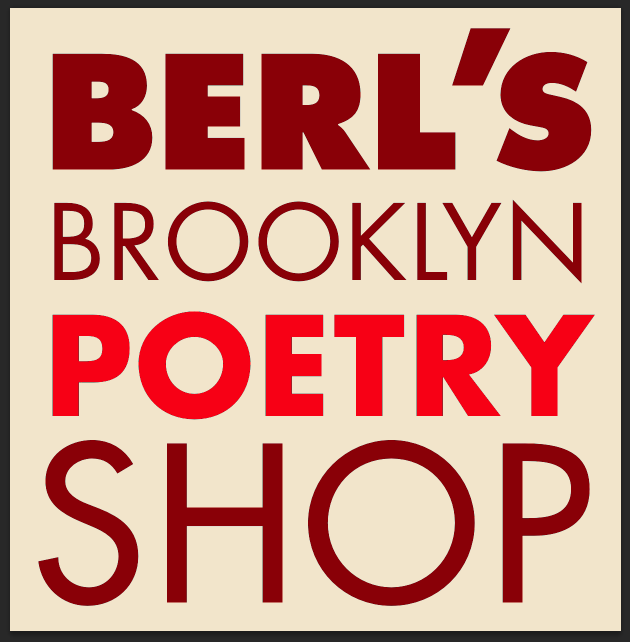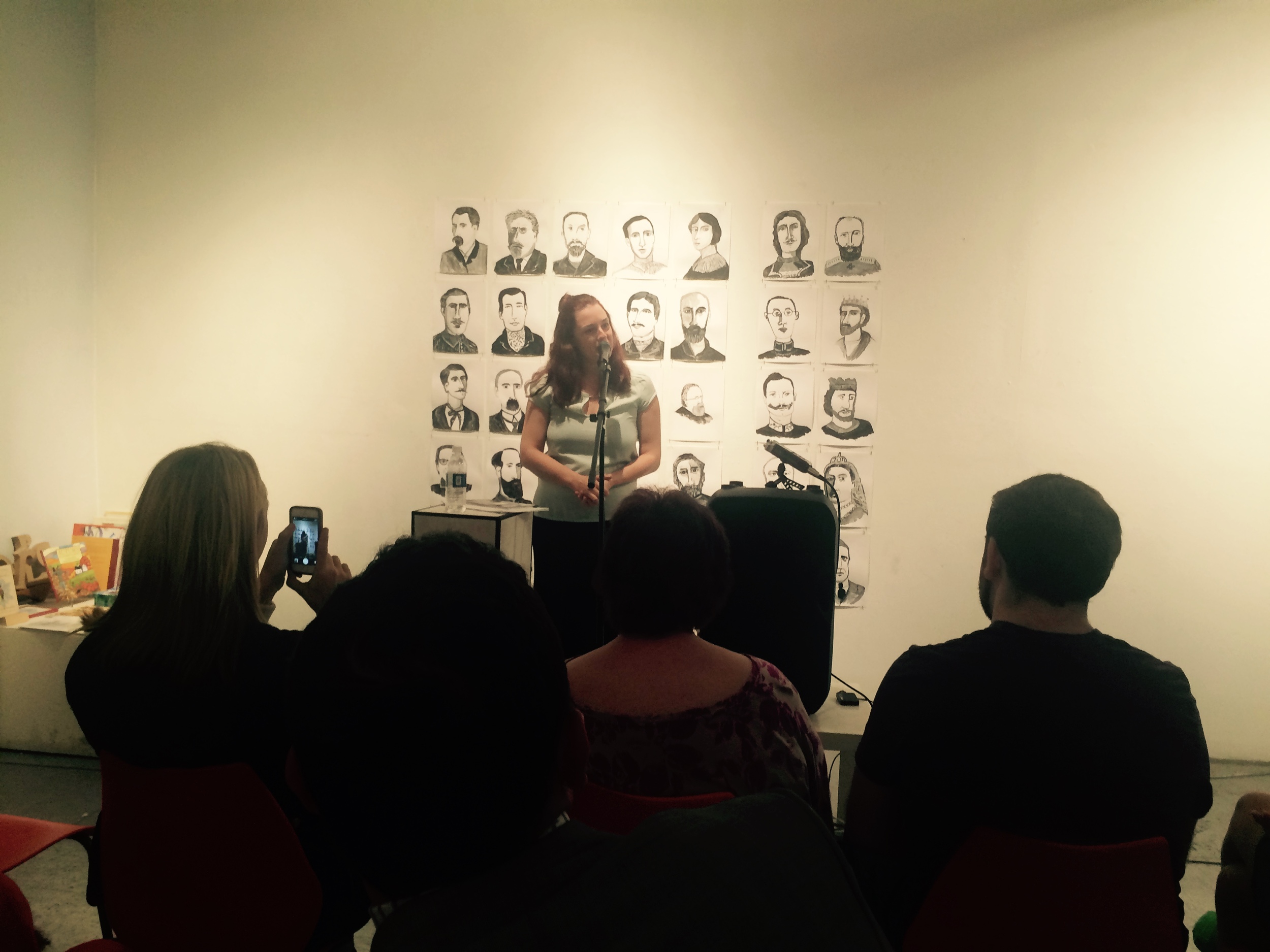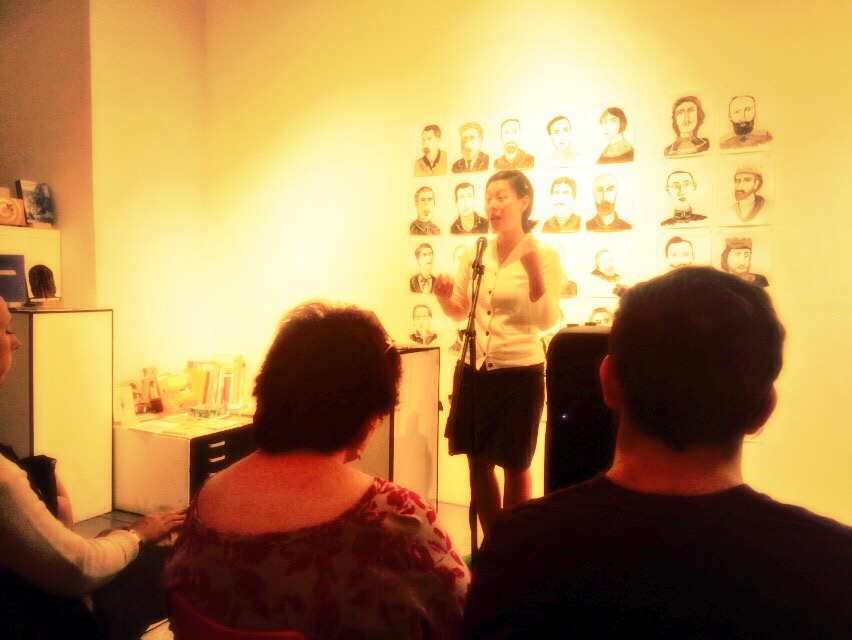A Reading featuring Melissa Buckheit and Sueyeun Juliette Lee
Here are Jared and Farrah's notes towards the introduction for the reading delivered by Jared:
I was just reading Melissa’s line “Any jar is an open sea” as Farrah at home with our son Roman, emailed me some notes on Juliette’s work in which she referenced Gerald Stern’s idea that a “lyric poet is one with a broken jar inside her,” saying that she couldn’t help thinking about the broken jar while reading Juliette’s work, how it searches, asking questions that aren’t or maybe can’t be answered. Farrah and I are have a baby due January so maybe that gave me a different angle on Gerald Stern’s broken jar, as if it isn’t an internal hemorrhage but a pregnancy – and this felt a great place to begin while introducing these two poets we’re so glad to have with us here in NY tonight, on the body as a site of both wound and possibility. That jar of open sea that Melissa writes about, or in an analogous moment in Sueyeun Juliette Lee’s poem “The Benefits of Having a Human Body:” most places I go to have disappeared. They do so all the time. I traveled in a ship at great speed across the sky. It was cavernous and dry. I was on my knees. Tell me about the things you also have ever seen. Were they bordered on three sides by the sea.
Phila, Tucson, Traveling, multicity tour…
Sueyeun Juliette Lee
Very glad that Juliette is reading here at Berl’s. Juliette’s a very talented book artist and a great reader and editor and I envision her as a reader being this sort of ethical hub, improving our conversation about poetry. found her recent essay on conceptualism, race, stupefied sublime, as just one example, eye opening and persuasive, full of totally invaluable insight and empathy. In our winding path to opening this bookstore, one of the crucial experiences was in helping our friends make chapbooks by hand and grasping how books like the ones we sell here could be appreciated as the physical remains of a living community. In a sort of maybe-apocryphal oral history sense I think that Juliette’s books inspired and taught the makers of other stab bound chapbooks so that I think we learned from students of her students. It makes me think of reading about how Philip Glass was the student of the student of the student of Beethoven. Lineages that hopefully mean that a community is growing and thriving. Her work publishing hand-sewn chapbooks at Corollary Press to create an explicit platform for multi-ethnic poets is a significant contribution.
Farrah and I were reading Juliette’s poetry today and we were struck by its quality of being multi-layered and elegiac in an unusual combination, because of the way she deploys different techniques including appropriation so her poems have a complex variety of textures that makes them full of surprise and mystery. Farrah said she is like four poets wrapped in one, which is perhaps one of the benefits of being a good editor, that others change the way you write. A poem of Juliette’s can veer very quickly from mystery to clarity, aphorism to observation, jadedness to awe. Here’s an example:
“We share a few things: your music is cheap and steady, which is understandably timeless. Worried by the lack of dimes, chasing the slot not tasting like peppers or ginseng. When tea makes the eyes water consider it ready, race to chalk lines for tennis. The human body is a marvel and I move faster for my hairlessness. This is suddenly mysterious and you are strummed. The night regains itself later before the outbreak of one hundred falling stars. We sense that miraculous as it is, this has happened before.”
There’s a quality of the apocalyptic here but the frame so tight on details like the peppers that this apocalypse only appears as a shadow, an immanence.
“The world begins its steady countdown. Closeup of his clenched fist.
I think the “closeup” is a key to reading Juliette’ writing: often she takes on this bewilderingly rapid journey from zoomed out macro politics to somewhere up close to a body. “The ‘nation’ as a furtive heterogeneity we want to read as flat // And it casts back an arbitrary stasis of “THEN” that this body (suddenly) enfolds”
Thus, as Farrah put it, Juliette’s poetry itches toward a loss “you erased the word home inside of you” in a way that is socioculturally observant and biting. I wrote down in my notes “punk stoicism” while reading lines of hers like “Hyeah! An angelic chop!”
Here are a couple excerpts from her poem called “dear Margaret Cho” – the universe in Juliette’s poem is tellingly in scare quotes:
“standing on a stage everything is comic, meaning small and memorable, or the insubstantial ‘universe’ a minor disaster or floating chord."
The way Melissa works a word like pelagic, Juliette does with “paene insula” (Peninsula means almost island but we get a lot of the pain as well.) She writes: “Paene insula. Of almosts. Paene, suffering what constitutionally reemerges, suffering predicated on absence [sensations]. If I could see all the way through to the horizon, maybe. Paene of distances, paene of nearsight. Paene of oceanic abundance, which we like to say was renamed ____: to mark or brand.”
Whether conceptual collage or elusive lyric argument or address, Juliette’s writing weighs and balances readership and writing through memory.
In her recent chapbook A PRIMARY MOTHER she writes “Add light to light and you have darkness. Add light to light and you have expanse. Add light to light and you have memory. Add light to light and you have light.
In her poems it’s as though everything is floating and everything is waiting to get snatched up from within her. As readers we get this movement from history and politics (war, partition of Korea) to the body both on micro and macro levels in Juliette’s work. She’ll be quoting the Korean Central News Agency commenting on the white house press office in poetry haunted by war and language and then ten pages later the book touches down “It is beautiful to be made a human, a human with eyes that see, ears that hear, hands that clasp things close to a ribbed chest, within which nests a sleeping cat or a remark on white birch trees along a hill. Beautiful to suffer injuries, to see blood ooze from a minor wound or scrape, how the skin, a softened paper, pulls away in a moist mass…. It is beautiful to wash an open wound.”
I’ll end with another quote from A PRIMARY MOTHER: “Slowly, the body reconvenes. Each pore an aperture, each thread a sieve.”
---
Last night, David Brazil gave a talk and reading here and mentioned Josephine Miles’s dichotomy of phrasal vs clausal poets, so I was thinking about that while reading Juliette and Melissa’s work today. It’s one of those distinctions that sounds perceptive while not holding that much water and requiring a lot of squinting and shoehorning. Juliette may be a bit of a clausal poet but I don’t think it sheds that much light to say so. Reading Melissa today, on the other hand, I actually found it really helped me to think about that idea of the phrasal poet and to zoom in, focusing on the way she uses phrases like a painter with brushstrokes. Her artistry seems rooted in the spaces between words, she is a poet of the comma.
“what origin begin with hair, the tenderest movement out, ends with bodies lining graves, an inability to pronounce the phonemes of your now foreign language. The language itself, an answer”
Amplifying this effect of lulling parataxis if the way she lays her poems out, so the often the words are strewn across the page like flecks drifting in a fluid.
“kelp-forests and / olive-green limpets, petrel, pelagic atoll, lipstick pixie, fairy puke- night aquifer”
you have to consult the notes – really more like a glossary, full of definitions of etymologically hefty terms like epiphyte and perilune and NOCTILUCENT (title of her recent book from Shearsman), vocabulary from the natural sciences, astronomy, Latin, Greek – to find that lipstick pixie and fairy puke are mosses from the Pacific northwest rainforest. This is emblematic of the experience of reading Melissa’s poetry, which seems built primarily out of a mixture of awe and calm. There’s a sense that part of her joy in writing poetry is to get the chance to dust these words off and take them out for a spin
Melissa is the second poet to read here at Berl’s this week who had the word “pelagic” in a poem (Seth Landman last Wednesday offered“pelagic silence”). Pelagic – though linked to the more normal word archipelago - seems pretty uncommon, kind of a loud, showy word that seems to emphasize “you’re reading this word in a poem. A poet is speaking.”
On one page “Pelagic shell adored, unadorned” and then the next the thought line continues: “Cool air, it’s pleasurable. Please from pelagos. Related word, placate—Any jar is an open sea.”
I admire how Melissa here is unpacking “pelagic” as a way of making similarly uncommon and loud and fresh and poem-y a whole constellation of normal words like placate and even the simple “please” (I have an almost two year old so I think a lot about the word “please” which my son pronounces “piz”.). Melissa makes me feel a little of this exciting estrangement from language, relocating the calm, navigable sea behind the idea of soothing pleasure.
Whether erotic or scientific There is something oceanic about her poetry, its lyrical measured flow; I found its pace leisurely and wave-like, forming small-eddies. Bodies in her poem are watery and feel marine.
“jelly like the pelvis appears among deep –sea vent”
“to deliver a slick baby through the salted fluid”
“a bottle of seawater wrapped in a skirt smelling of her body”
When I stayed in Tucson we ended up at the home of a filmmaker who had constructed a grotto in his desert-y backyard surrounded by tall grass with deck chairs facing a large colorful photograph on sun-resistant truck siding like a personal billboard depicting dunes on a beach. I thought of this sensuous optical illusion of the ocean hundreds of miles inland when I was reading Melissa’s work. She reminds how we carry the ocean inside us.


